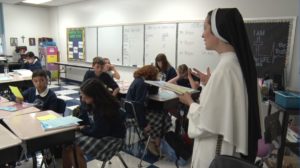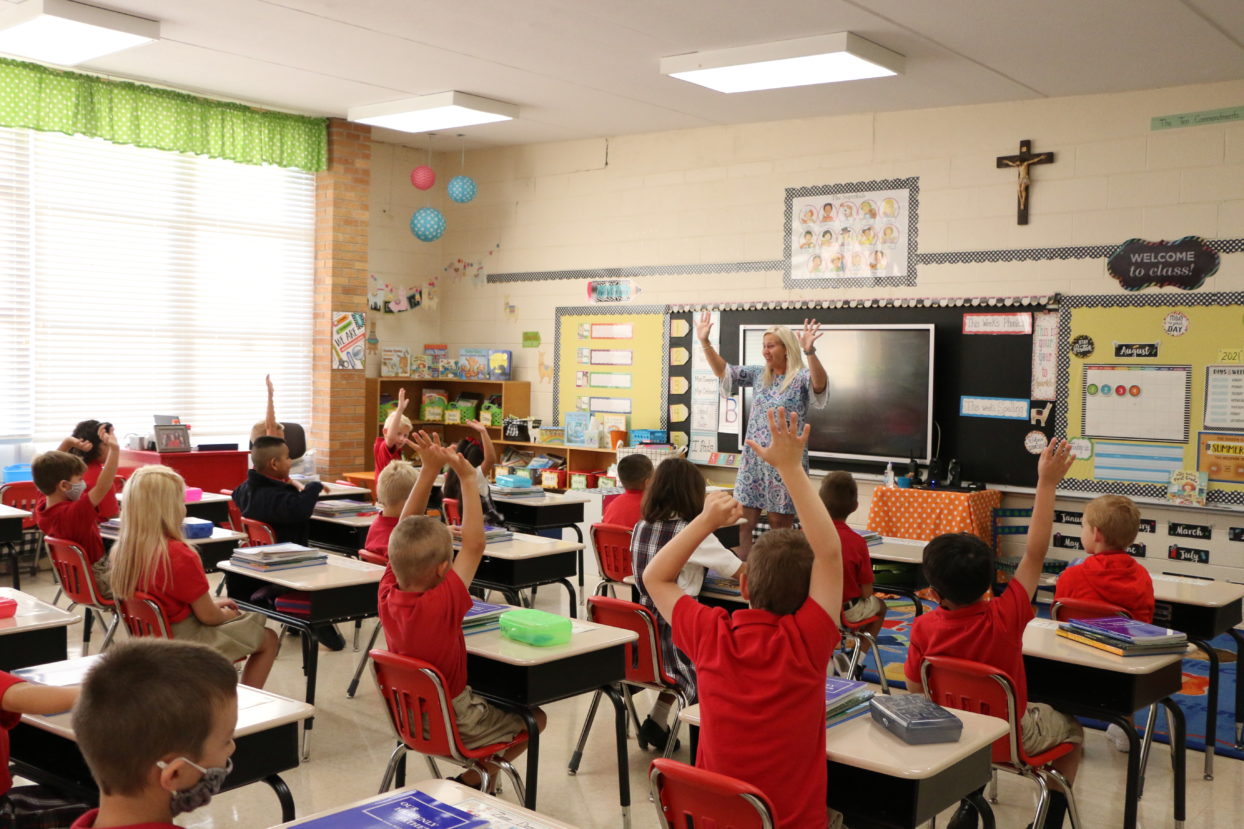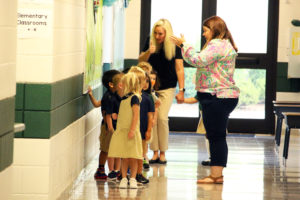Double-digit rises reported at some campuses as students, faculties, parents settle into new academic year
By Bill Brewer
Diocese of Knoxville schools are reporting a healthy 7.8 percent increase in enrollment as the 2021-22 academic year gets underway, which bucks a trend among some Catholic school systems that are seeing decreasing enrollment.
Leading the way among diocesan schools are St. Dominic in Kingsport, with an 18.5 percent jump, St. John Neumann in Farragut, which has seen an 11.2 percent hike over the 2020-21 school year, and Our Lady of Perpetual Help School in Chattanooga, which is enjoying a 10.7 percent rise.
Sacred Heart Cathedral School is recording a modest 0.5 percent increase, but that number elevates to 25.6 percent when factoring in gains in Sacred Heart’s preschool program.
Dr. Sedonna Prater, superintendent of Diocese of Knoxville schools, believes part of the reason for the healthy enrollment increases is parents recognize how well diocesan schools have performed during the COVID pandemic.

Sister Maria Kolbe, OP, goes over notes with her seventh-grade class at St. Mary School in Oak Ridge to begin the 2021-22 academic year.
While many school districts suspended academic programs as they figured out how to transition to online learning in 2020, Diocese of Knoxville schools didn’t skip a class.
“Part of the reason we’ve had an increase in enrollment is the way that we managed everything last year. We didn’t skip a beat. Except for a couple of days, we did pivot to at-home learning during the mandate, from March 2020 to May 2020,” Dr. Prater said.
“We believed wholeheartedly, from a philosophical standpoint and for the educational, social-emotional welfare of the children, that they needed to be onsite at school rather than remote. Last year we worked very diligently to figure out the best plan to ensure that happened. We were very successful in doing that,” she added.
Since then, Dr. Prater said she has been learning of educational deficits in children during the pandemic in school districts where remote learning was prolonged.
“I am happy to report that our students had minimal loss because we were onsite, we did remote learning days periodically more as a break because we didn’t have long, extended breaks. But we never had to shut down due to illness, not once last year,” she said.
She noted that word got out in East Tennessee school communities that the Catholic schools were continuing a full academic curriculum in the face of pandemic-related paralysis among some public-school districts. “When a lot of schools were closing down and we were still in, [parents] were asking those questions.”
Diocesan schools picked up some students during the pandemic year, but the numbers increased significantly this summer, Dr. Prater pointed out.
Not all Catholic school districts have fared as well as the Diocese of Knoxville.
According to the National Catholic Education Association, enrollment in U.S. Catholic schools decreased by 6.4 percent, or more than 111,000 students, between the fall of 2019 and the fall of 2020. The enrollment drop accompanied the closure of 209 U.S. Catholic schools in 2020, more than double the annual number of closures, a sobering statistic that the NCEA said was fueled by the COVID pandemic.
Despite that, Dr. Prater expects to hear success stories from other dioceses that also elected to keep their schools fully functional during the pandemic.
Caroline Carlin, principal of Our Lady of Perpetual Help, said it’s a challenge to pinpoint one specific reason for the 51-student increase at her school.
“We are seeing people move into the Chattanooga area from densely Catholic areas of the country, such as the northeast. We also have been doing some marketing, promoting our school in the community. OLPH for over 80 years has a strong reputation for Catholic education in Chattanooga, and our faculty have become great ambassadors for what we do,” Ms. Carlin said.
She noted that an increase in students began in the 2020-21 academic year as parents looked for alternatives to public education as the COVID-19 pandemic continued to impact education.
“What we’ve been delighted to see is those who came to us during the pandemic have decided to stay with us,” Ms. Carlin added.
She pointed out that what little attrition OLPH saw at the end of the 2020-21 academic year was due to family relocations.
“No one left us because of dissatisfaction,” she said. “That is what we are most proud of. Our families continue to stay with us and commit to OLPH’s excellent curriculum programs and faith-based education.”
When asked how the diocese can maintain the enrollment trajectory, Dr. Prater said, “I’ve always believed the adage that people come to us for a lot of reasons. They come to us because of academics or athletics or the faith. Usually, it isn’t the first reason they come to us; it’s because we’re doing something great. But I believe it’s the faith community that keeps them there. It’s the atmosphere and community that we create. It’s the sense of belonging and how we care about the students and what we’re doing with them. Once they see that difference, that’s what keeps them there.”
The Diocese of Knoxville established last month at the beginning of this school year that there would be no mandate to require students and faculty to wear masks during school as COVID-19 cases continue to be reported.
The diocese is placing COVID protections for children in the hands of their parents, and Dr. Prater is encouraging students to wear masks.
“If you are unvaccinated, we are strongly encouraging our families to mask; if you are immunocompromised, we are encouraging you to mask,” Dr. Prater said. “And we are encouraging vaccinations. Medical professionals are telling us vaccinations are our best opportunity to protect ourselves and to protect young children who can’t be vaccinated.”
She noted that diocesan schools are discussing hosting vaccination clinics for students, faculty, and possibly the public.
Dr. Prater said some parents are unhappy that the diocese is not requiring that masks again be worn during school this academic year as in the last school year and noted that just as many parents or more would be unhappy if there was a mask mandate.
“What we are trying to convey and will continue to convey is that we always are in partnership with families in the education of their children. We’re going to do the very best to educate them holistically, in their spiritual formation, their social, emotional, and physical development, everything. That was one of the things we had to weigh with the policies this year, not just being concerned with their physical health but also with their social-emotional development,” she said.
“We listened to parents, and we listened and read all the different sides. Now that they are there with us, we just have to deliver what we’ve promised. We have to deliver the best academic program and that holistic care for the whole child. And we will continue to partner with them. I know that we will do that,” she added.
Dr. Prater is confident in new leadership at seven of the diocese’s 10 schools. New principals have been named within the last two years at St. Mary in Johnson City (Becky Frye), St. Dominic in Kingsport (Darlene Lyons), Sacred Heart in Knoxville (Joan Turbyville), St. Mary in Oak Ridge (Sister Mary John Slonkosky, OP), Notre Dame High School (Kyle Schmitt), Our Lady of Perpetual Help in Chattanooga (Caroline Carlin), and St. Jude in Chattanooga (Joshua Overton).
Dickie Sompayrac at Knoxville Catholic High School, Bill Derbyshire at St. John Neumann, and Andy Zengel at St. Joseph are the veteran administrators.
Dr. Prater also is confident the principals and faculty at all 10 schools will continue to achieve a level of excellence that is resulting in enrollment gains, especially as the schools go through re-accreditation this academic year.
Mr. Zengel said in remarks to begin the 2021-22 academic year that he understands how anxious parents are as the new year gets underway. He is a parent of five children, all under age 14, and four of them attend St. Joseph.
“I can honestly admit, like every other year, but especially since we’re still in the midst of a pandemic, that I’m a little nervous. When we had our meet and greet (to begin the school year), about a third of the families were wearing masks even though they’re not mandated this year. So that tells me people are still very nervous about things. But I also know that they all came to school. I think everyone — parents, students, and definitely our staff — are very hope-filled that this will be a year that we can continue handing on the Catholic faith and excellent teaching here at St. Joseph School,” Mr. Zengel said.
“We want to make sure we keep everyone safe and follow our protocols. We learned a lot last year, but we also know the value of in-person education is tremendous. That’s our goal, that we are able to stay open in the midst of a pandemic, that teaching and learning continues, and whatever protocols are handed down to us by the local authorities, by Bishop Stika, we’re going to follow those, and we will endure. I don’t want to be beaten down by doubt or just too much fear. We can do some common-sense things to keep people safe, and we can continue to learn and teach,” he added.


